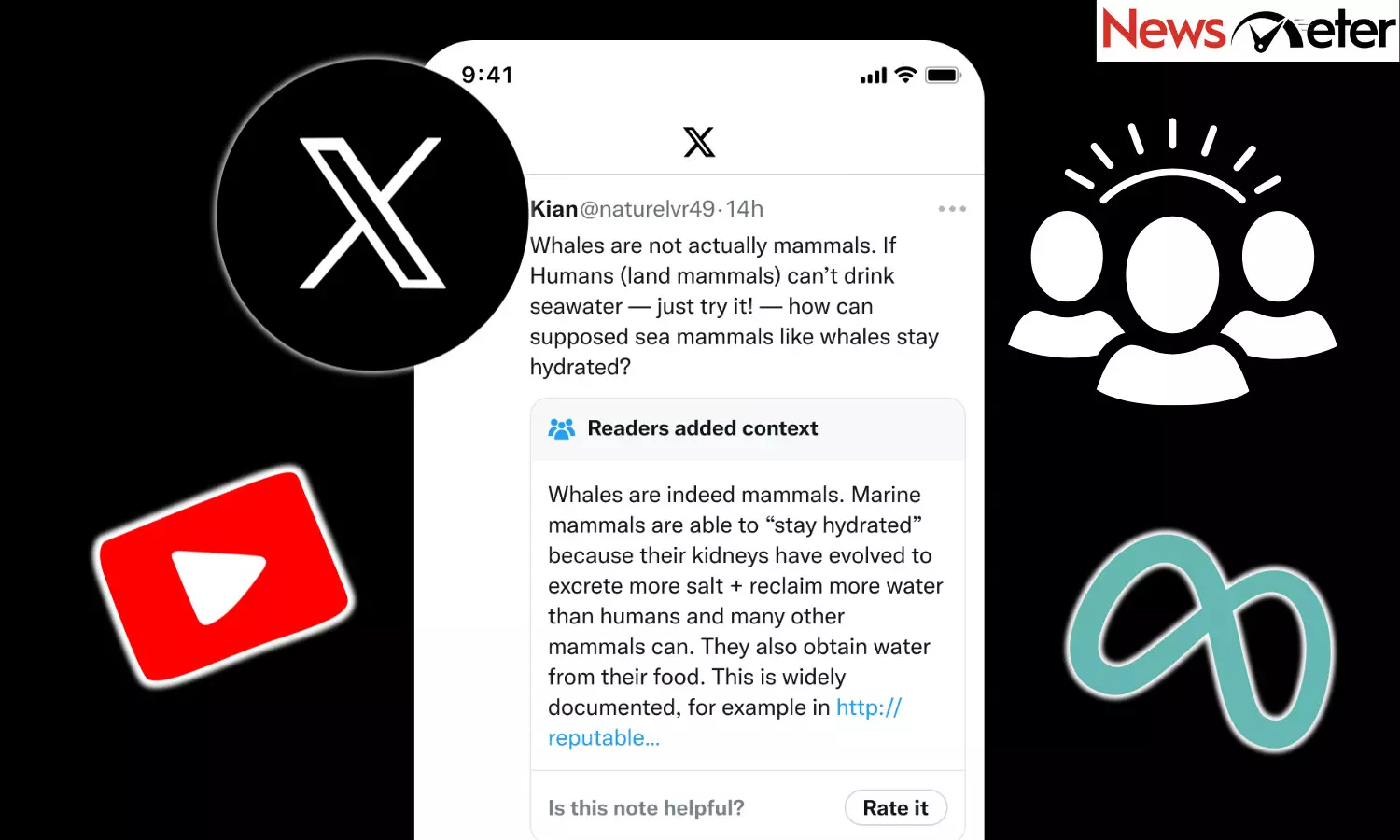Community Notes Can’t Stand Without Fact-Checkers, Says Research — So, Are Big Tech Platforms Taking Advantage?
A recent study by Maldita.es reveals that fact-checking organisations are the third most referenced sources globally in Community Notes on X,
By Dheeshma Puzhakkal
Hyderabad: Over a month ago, Meta announced a significant shift in the US, transitioning from its Third-Party Fact-Checking (3PFC) program to a Community Notes-style system similar to X. This evolution raises important questions: Is this the future of fact-checking, or are professional fact-checkers being sidelined and their expertise undervalued?
Meta’s 3PFC program, still active outside the US with partners like NewsMeter, collaborates with IFCN-certified fact-checking organisations, providing financial support to scrutinise and flag misinformation. This model ensures that trained professionals are at the forefront of combating false narratives. However, the new direction leans towards crowdsourcing, relying on voluntary contributions to moderate online content without direct compensation for the experts whose work underpins these efforts.
Fact-Checkers: The unseen backbone of Community Notes
A recent study by Maldita.es offers insight into this paradigm shift. The research reveals that fact-checking organisations are the third most referenced sources globally in Community Notes on X, following X itself and Wikipedia. This points out the reliance on professional fact-checkers to provide credible information, yet their contributions often go uncredited and uncompensated.
The visibility problem
Community Notes aims to democratise fact-checking by enabling users to assess and contextualise claims, potentially offering diverse perspectives and reducing perceived institutional biases. However, the Maldita.es study highlights a critical flaw: most Community Notes remain unseen by readers. This limited visibility means that, despite the foundational work of fact-checkers, the system fails to consistently deliver accurate corrections to the public, undermining its mission to combat misinformation.
Effectiveness in reducing misinformation engagement
Further complicating the issue, a study titled “Did the Roll-Out of Community Notes Reduce Engagement With Misinformation on X/Twitter?” by Chuai et al. (2024) examined the effectiveness of Community Notes in diminishing interactions with misleading content. The researchers employed Difference-in-Differences models and Regression Discontinuity Design to analyse data encompassing all fact-checking notes and corresponding tweets since Community Notes’ inception in early 2021. Despite a notable increase in fact-checking activity, especially concerning tweets from verified users with substantial followings, the study found no significant reduction in engagement with misleading tweets. This suggests that Community Notes may be too slow to impact the early, most viral stages of misinformation spread.
The sustainability of professional fact-checking
This shift towards crowdsourced models also raises concerns about the sustainability of professional fact-checking.
If platforms increasingly depend on unpaid volunteers, the financial and institutional support for dedicated fact-checking organisations could wane. While Community Notes has its merits, it is susceptible to manipulation. Coordinated groups might promote misleading but popular notes, creating false narratives. In contrast, professional fact-checkers bring expertise and methodological rigour that is challenging to replicate in a decentralised system.
Risks in the Indian context
In the Indian context, there are even deeper concerns about the manipulation of Community Notes. According to the Centre for Justice and Peace (CJP), Community Notes could enable subtle yet dangerous forms of misinformation in the country. Coordinated groups with ideological agendas might promote misleading but popular notes, suppressing fact-based corrections and amplifying narratives aligned with political or communal biases. This vulnerability could exacerbate India’s already polarised digital landscape, where disinformation campaigns often target minority communities and political opponents. The potential for these notes to be weaponised highlights the importance of retaining independent, professional oversight.
A symbiotic approach for the future
The Maldita.es study suggests that Community Notes should complement, not replace, professional fact-checking. A sustainable approach would involve platforms acknowledging this symbiotic relationship by compensating fact-checkers for their expertise or partnering more directly to enhance accuracy and reach.
While democratising fact-checking has advantages, it should not come at the expense of undervaluing the professionals dedicated to combating misinformation. For Community Notes and similar models to be truly effective, platforms must not only benefit from fact-checkers' labour but also reward and empower them.
The issue extends beyond the methods of fact-checking in the digital era; it encompasses ensuring that those undertaking the most challenging and often thankless tasks are neither overlooked nor exploited in the process.